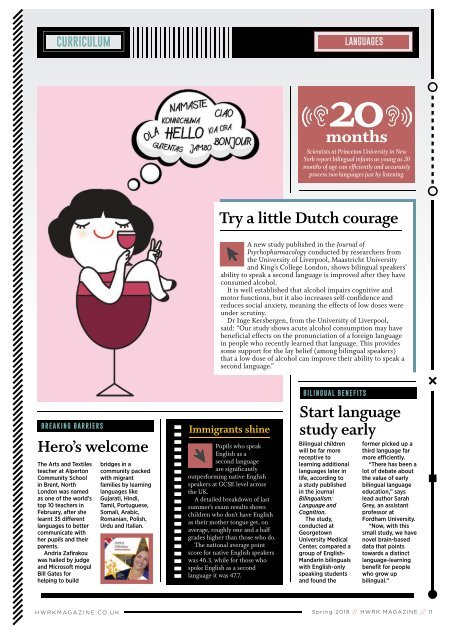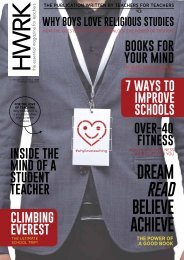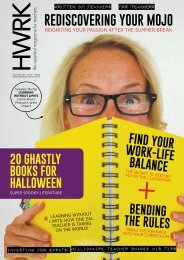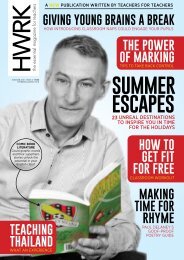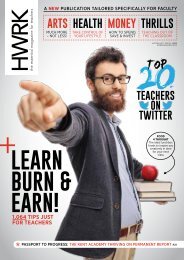HWRK Magazine: Issue 03 - Spring 2018
HWRK Magazine
HWRK Magazine
Create successful ePaper yourself
Turn your PDF publications into a flip-book with our unique Google optimized e-Paper software.
CURRICULUM<br />
LANGUAGES<br />
20<br />
months<br />
Scientists at Princeton University in New<br />
York report bilingual infants as young as 20<br />
months of age can efficiently and accurately<br />
process two languages just by listening.<br />
Try a little Dutch courage<br />
A new study published in the Journal of<br />
Psychopharmacology conducted by researchers from<br />
the University of Liverpool, Maastricht University<br />
and King’s College London, shows bilingual speakers’<br />
ability to speak a second language is improved after they have<br />
consumed alcohol.<br />
It is well established that alcohol impairs cognitive and<br />
motor functions, but it also increases self-confidence and<br />
reduces social anxiety, meaning the effects of low doses were<br />
under scrutiny.<br />
Dr Inge Kersbergen, from the University of Liverpool,<br />
said: “Our study shows acute alcohol consumption may have<br />
beneficial effects on the pronunciation of a foreign language<br />
in people who recently learned that language. This provides<br />
some support for the lay belief (among bilingual speakers)<br />
that a low dose of alcohol can improve their ability to speak a<br />
second language.”<br />
BREAKING BARRIERS<br />
Hero’s welcome<br />
The Arts and Textiles<br />
teacher at Alperton<br />
Community School<br />
in Brent, North<br />
London was named<br />
as one of the world’s<br />
top 10 teachers in<br />
February, after she<br />
learnt 35 different<br />
languages to better<br />
communicate with<br />
her pupils and their<br />
parents.<br />
Andria Zafirakou<br />
was hailed by judge<br />
and Microsoft mogul<br />
Bill Gates for<br />
helping to build<br />
bridges in a<br />
community packed<br />
with migrant<br />
families by learning<br />
languages like<br />
Gujarati, Hindi,<br />
Tamil, Portuguese,<br />
Somali, Arabic,<br />
Romanian, Polish,<br />
Urdu and Italian.<br />
Immigrants shine<br />
Pupils who speak<br />
English as a<br />
second language<br />
are significantly<br />
outperforming native English<br />
speakers at GCSE level across<br />
the UK.<br />
A detailed breakdown of last<br />
summer’s exam results shows<br />
children who don’t have English<br />
as their mother tongue get, on<br />
average, roughly one and a half<br />
grades higher than those who do.<br />
The national average point<br />
score for native English speakers<br />
was 46.3, while for those who<br />
spoke English as a second<br />
language it was 47.7.<br />
BILINGUAL BENEFITS<br />
Start language<br />
study early<br />
Bilingual children<br />
will be far more<br />
receptive to<br />
learning additional<br />
languages later in<br />
life, according to<br />
a study published<br />
in the journal<br />
Bilingualism:<br />
Language and<br />
Cognition.<br />
The study,<br />
conducted at<br />
Georgetown<br />
University Medical<br />
Center, compared a<br />
group of English-<br />
Mandarin bilinguals<br />
with English-only<br />
speaking students<br />
and found the<br />
former picked up a<br />
third language far<br />
more efficiently.<br />
“There has been a<br />
lot of debate about<br />
the value of early<br />
bilingual language<br />
education,” says<br />
lead author Sarah<br />
Grey, an assistant<br />
professor at<br />
Fordham University.<br />
“Now, with this<br />
small study, we have<br />
novel brain-based<br />
data that points<br />
towards a distinct<br />
language-learning<br />
benefit for people<br />
who grow up<br />
bilingual.”<br />
<strong>HWRK</strong>MAGAZINE.CO.UK <strong>Spring</strong> <strong>2018</strong> // <strong>HWRK</strong> MAGAZINE // 11


